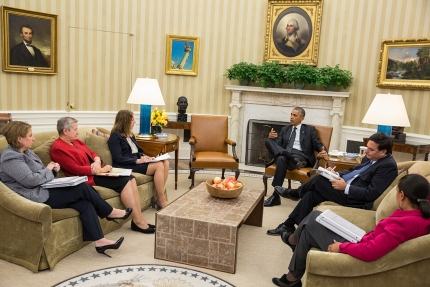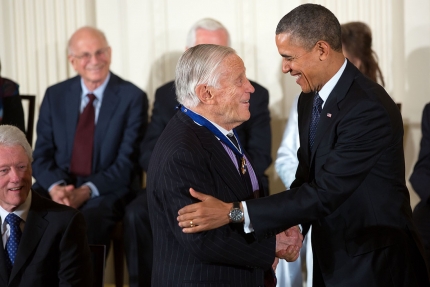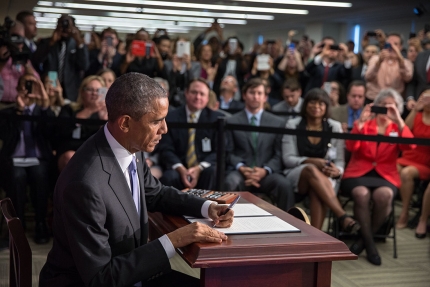Remarks by the President on the U.S. Government's Ebola Response and the Shooting Incident in Canada
Oval Office
4:00 P.M. EDT
THE PRESIDENT: Well, I wanted to give you an update I just received from the team that’s been working day and night to make sure that the American people are safe and that we’re dealing effectively with not just the Ebola case here, but the outbreak and epidemic that’s taking place in West Africa.
A number of things make us cautiously more optimistic about the situation here in the United States. First of all, we now have seen dozens of persons who had initial interaction with Mr. Duncan, including his family and friends, and in some cases people who have had fairly significant contact with him, have now been cleared and we’re confident that they do not have Ebola. And it just gives, I think, people one more sense of how difficult it is to get this disease. These are people, in some cases, who were living with Mr. Duncan and had fairly significant contact with him. They, we now know, do not have Ebola.
And so, once again, I want to emphasize to the public: This is not airborne; you have to have had contact with the bodily fluids of somebody who is actually showing symptoms of Ebola, which is why it makes it so hard to catch, although it obviously is very virulent if, in fact, you do come into contact with such bodily fluids.
Our hearts and thoughts and prayers are still with the two nurses who were affected. Again, we’re cautiously optimistic. They seem to be doing better, and we continue to think about them.
I had a chance to talk to a number of their coworkers at Texas Presbyterian today. Spirits were good. People were very proud of the work that they’ve done, and understandably so. Because as I’ve said before, when it comes to taking care of us and our families, nobody is more important than the frontline health workers and nurses in particular who so often are the ones who have immediate and ongoing contact with patients. And they’re very proud of what they’ve done, and want to make sure that everybody understands how seriously they take their work and how important they consider their jobs to be.
In addition, what we’ve also seen is two American patients, who got Ebola outside but were brought here to be treated, have now been cleared. They have been cured, and we’re obviously very happy about that. I know their families are thrilled about that.
And finally, we also received news that, according to the World Health Organization, both Nigeria and Senegal are Ebola-free. Now, these are countries that are adjoining the three West African countries that are experiencing the most severe aspects of this disease. And again, it gives you some sense that when it’s caught early, and where the public health infrastructure operates effectively, this outbreak can be stopped.
What we’ve also been talking about then is dealing with the particulars of the situations as it arose in Dallas and what we’re doing to making sure that we don’t see a repeat of some of the problems with the protocols that took place in Dallas.
First of all, with respect to Dallas, working in coordination with Governor Perry, Mayor Rawlings and health officials in Dallas and throughout Texas, we now are very confident that if any additional cases came up in Texas, that there is a plan in place where they would go receive first-class treatment. And we continue to actively monitor those who remain at risk because they were involved in Mr. Duncan’s treatment -- although a number of them rolled off of the list of people who could possibly get it today. And each day, more and more folks are cleared and can be confident that they don’t have Ebola.
We surged resources both to Dallas and to Cleveland, making sure that the CDC is on the ground so that if additional cases arise out of the Dallas situation, as well as the second nurse who flew to Cleveland, that we’re on the ground and we don’t repeat any problems with respect to the protocols that have to be followed.
The CDC has refined and put in place guidelines that will make sure that both in terms of protective gear and how it’s disposed, and how we monitor anybody who might have Ebola, that those are tighter. And our team has spent a lot of time reaching out to hospitals, doctors, nurses’ associations, health care workers. There were thousands who were trained at the Javits Center just yesterday, I believe.
And so we’re going to systematically and steadily just make sure that every hospital has a plan; that they are displaying CDC information that has currently been provided so that they can step-by-step precautions when they’re dealing with somebody who might have Ebola.
And I’m confident that over the course of several weeks and months, each hospital working in conjunction with public health officials in those states are going to be able to train and develop the kinds of systems that ensure that people are prepared if and when a case like this comes up. And that ultimately is going to be the most important thing.
This is a disease where if it’s caught early and the hospital knows what to do early, it doesn’t present a massive risk of spreading. But we have to make sure that everybody is aware of it. And obviously, given all the attention that this situation has received, as you might expect, hospital workers and the CEOs of hospitals, and dentists, and anybody who has contact with potential patients is paying a lot more attention and is much more open to making sure that they’ve got a sound plan in place. And we’re going to be helping everybody to make sure that they put that plan in place.
In addition, I know that there’s been a lot of concern around the issue of individuals traveling from the three nations in West Africa that are most affected. So, as has already been announced, what’s now happening is all flights from those nations are being funneled into three airports -- or five airports, rather. Each of those airports have systems in place so that all the passengers getting off those flights will be monitored.
The CDC announced today that it’s going to take some additional steps to provide information to states so that they can actively monitor what’s taking place with those persons for a period of 21 days in order to protect the citizens of their various states, and will continue to put in place additional measures as they make sense in order to assure that we don’t see a continuing spread of this disease.
And on the international front, the good news is, is that along with the billion dollars that we are putting in, we’ve now seen an additional billion dollars from the world community to start building isolation units in Liberia, Guinea and Sierra Leone. Health workers are beginning to surge there. We’ve got 100 CDC personnel on the ground, as well as more than 500 military personnel.
I should emphasize that our military personnel is not treating patients. But what we’re doing, which nobody else really has the capacity to do, is to build the infrastructure -- the logistical systems, the air transport, the construction -- so that, as other countries start making contributions, they can be confident that it’s going to get in where it’s most needed, and it’s going to be coordinated effectively. And we just want to thanks, as always, our men and women in uniform who are doing an outstanding job there.
We’re already starting to see some very modest signs of progress in Liberia. We’re concerned about some spike in cases in Guinea. One of the good things that has come out of all the attention that this has received over the last several months -- and, frankly, the coordination of the United States with the international community -- is that people understand if we are going to protect all of our citizens globally, we have to do a better job of getting into these countries quicker and providing more help faster. And American leadership has been vital in that entire process.
So the top line, I think the key message I want to deliver is that although, obviously, people had concerns with Mr. Duncan -- and our hearts still go out to his family as well as the two nurses that were infected -- in fact, what we’re seeing is that the public health infrastructure and systems that we are now putting in place across the board around the country should give the American people confidence that we’re going to be in a position to deal with any additional cases of Ebola that might crop up without it turning into an outbreak.
And I want to emphasize again: This is a very hard disease to get. And in a country like the United States that has a strong public health infrastructure and outstanding health workers and hospitals and systems, the prospect of an outbreak here is extremely low. If people want to make sure that as we go into the holiday season their families are safe, the very best thing they can do is make sure that everybody in the family is getting a flu shot. Because we know that tens of thousands of people will be affected by the flu this season, as is true every season.
I’ll say one other thing about this. If there’s a silver lining in all the attention that the Ebola situation has received over the last several weeks, it’s a reminder of how important our public health systems are. And in many ways, what this has done is elevated that importance. There may come a time, sometime in the future, where we are dealing with an airborne disease that is much easier to catch and is deadly. And in some ways, this has created a trial run for federal, state and local public health officials and health care providers, as well as the American people, to understand the nature of that and why it’s so important that we’re continually building out our public health systems but we’re also practicing them and keeping them in tip-top shape, and investing in them, because oftentimes the best cures to prevent getting diseases in the first place -- and that’s true for individuals, it’s true for the country as a whole.
Thank you very much, everybody.
Q Can you say something about Canada?
THE PRESIDENT: Oh, thank you very much. I appreciate -- thank you. I had a chance to talk with Prime Minister Harper this afternoon. Obviously, the situation there is tragic. Just two days ago, a Canadian soldier had been killed in an attack. We now know that another young man was killed today. And I expressed on behalf of the American people our condolences to the family and to the Canadian people as a whole.
We don’t yet have all the information about what motivated the shooting. We don’t yet have all the information about whether this was part of a broader network or plan, or whether this was an individual or series of individuals who decided to take these actions. But it emphasizes the degree to which we have to remain vigilant when it comes to dealing with these kinds of acts of senseless violence or terrorism. And I pledged, as always, to make sure that our national security teams are coordinating very closely, given not only is Canada one of our closest allies in the world but they’re our neighbors and our friends, and obviously there’s a lot of interaction between Canadians and the United States, where we have such a long border.
And it’s very important I think for us to recognize that when it comes to dealing with terrorist activity, that Canada and the United States has to be entirely in sync. We have in the past; I’m confident we will continue to do so in the future. And Prime Minister Harper was very appreciative of the expressions of concern by the American people.
I had a chance to travel to the Parliament in Ottawa. I’m very familiar with that area and am reminded of how warmly I was received and how wonderful the people there were. And so obviously we’re all shaken by it, but we’re going to do everything we can to make sure that we’re standing side by side with Canada during this difficult time.
Q What does the Canadian attack mean to U.S. security, Mr. President?
THE PRESIDENT: Well, we don’t have enough information yet. So as we understand better exactly what happened, this obviously is something that we’ll make sure to factor in, in the ongoing efforts that we have to counter terrorist attacks in our country.
Every single day we have a whole lot of really smart, really dedicated, really hardworking people -- including a couple in this room -- who are monitoring risks and making sure that we’re doing everything we need to do to protect the American people. And they don’t get a lot of fanfare, they don’t get a lot of attention. There are a lot of possible threats that are foiled or disrupted that don’t always get reported on. And the work of our military, our intelligence teams, the Central Intelligence Agency, the intelligence community more broadly, our local law enforcement and state law enforcement officials who coordinate closely with us -- we owe them all a great deal of thanks.
Thank you, guys. Appreciate you.
END
4:16 P.M. EDT





